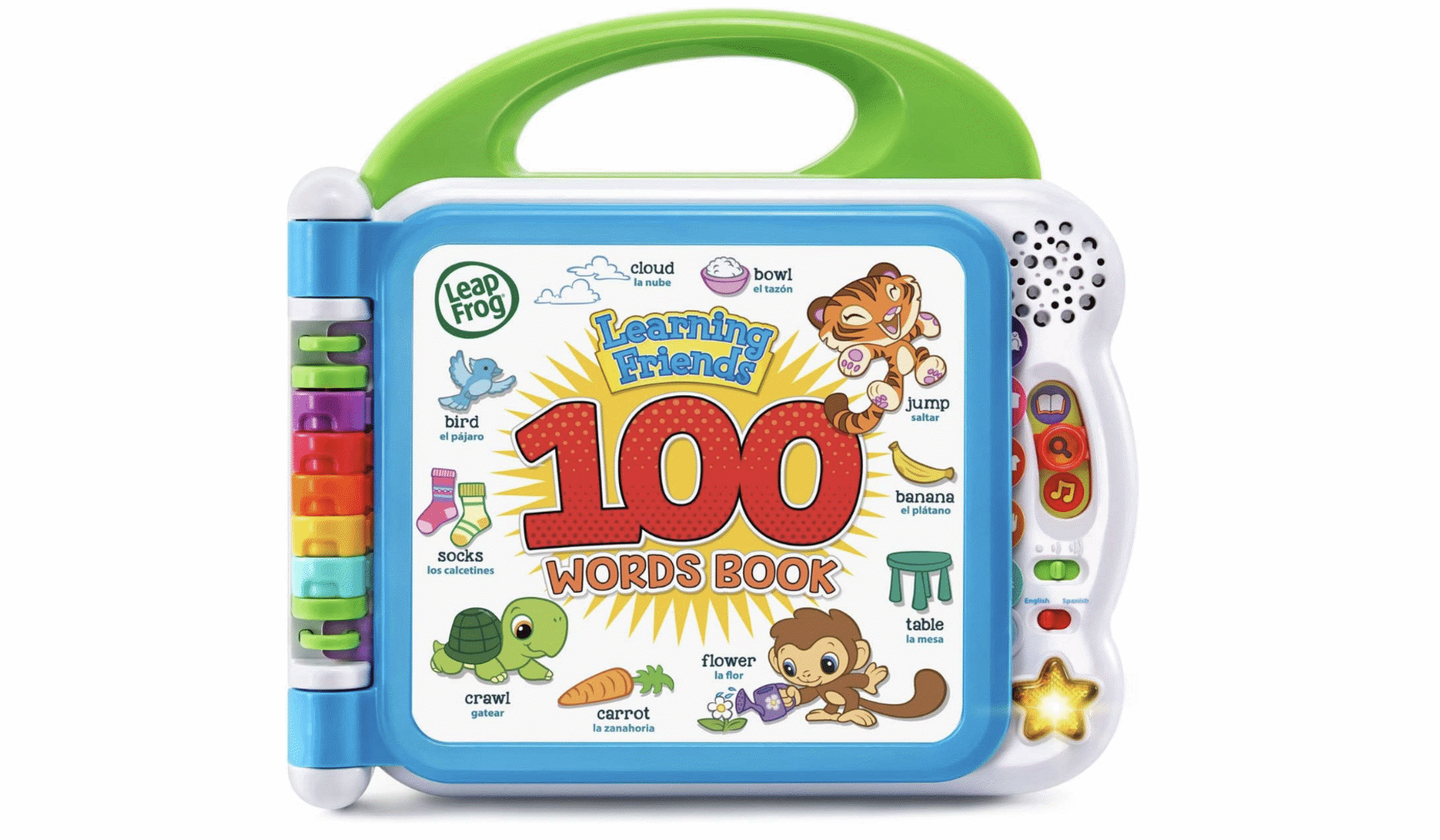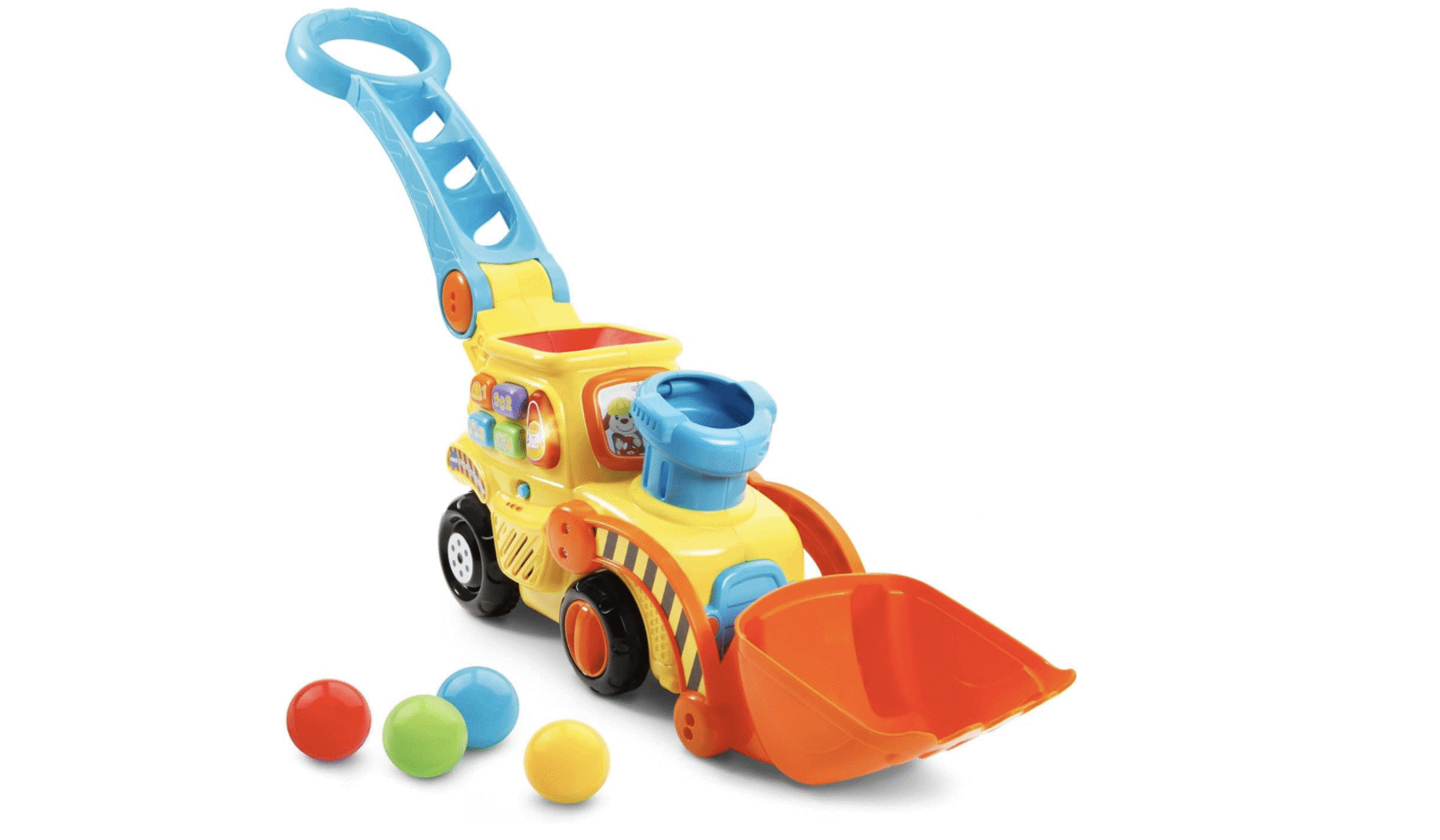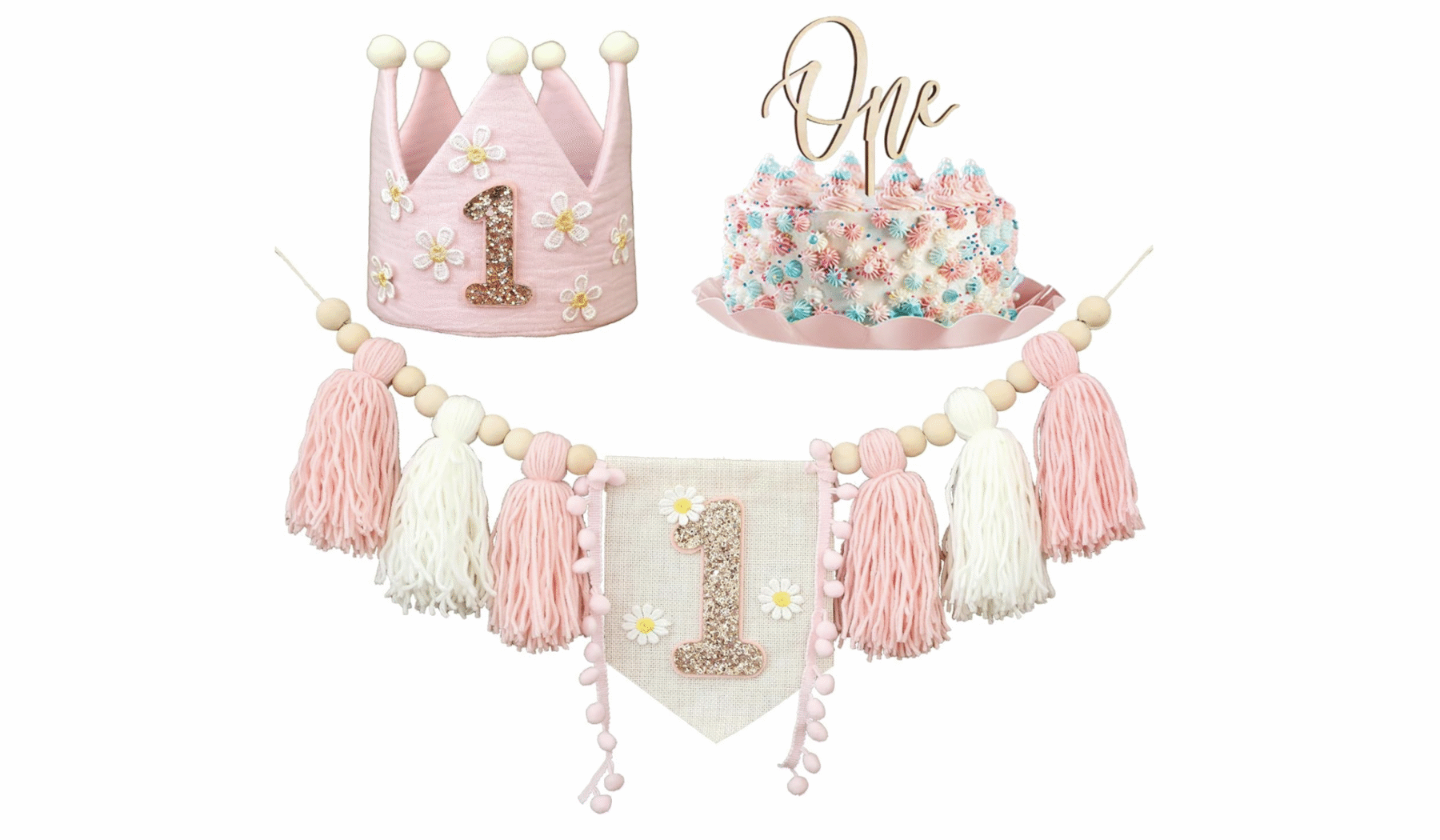11-Month-Old
If you experience some regression in some areas of development with your baby these days, that's okay. Your little one is undergoing numerous cognitive and physical changes affecting their mood, personality, and daily routines. You are the person your little one likely feels safest and most comfortable with, so you can expect them to be more attached to you than usual as they navigate through these new developmental phases.
As your little one approaches their first birthday, you've probably noticed some big changes in their physical appearance and growth. That once-tiny newborn is long gone, and your little one looks more and more like a proper little human each day!
On average, when your baby is eleven months old, boys typically weigh between 17 and 27 pounds, while girls weigh 15 to 25 pounds. Regarding height, boys usually measure around 27 to 32 inches, while girls range from 26 to 31 inches. Remember that these figures are rough estimates. As long as your baby steadily grows, there's no need to worry.
One of the most noticeable changes you might spot in your little one soon is the gradual shift in their physical appearance. They are putting on more muscle this month and losing some of those adorable baby rolls. Those chubby cheeks and thigh rolls might have been irresistible, but their changing physique is an excellent sign of a growing, active child!
Babies at this stage are becoming much more mobile, and their muscles are working hard to keep up with their newfound skills. This month, crawling, pulling up to stand, and even taking a few wobbly steps could all be happening.
On top of this, you may also notice changes in your baby's hair and teeth. Some little ones might be sporting a more prominent head of hair by now, while others might still be in the peach fuzz stage. Both are perfectly normal! When it comes to teeth, your baby might have their first teeth still just emerging or might already have a handful of teeth by now. Keep up with regular brushing, even though their toothy grin is still a work in progress.
By now, you have probably learned whether or not your little one experiences separation anxiety when out of your presence. Your baby loves and depends on you, which is why being without you is often an emotional experience.
As you have likely learned by now, keeping your goodbyes short and sweet can make them easier for both of you. Even if your little one seems in distress as you leave, once you are out of sight and they become distracted by something, those tears and anxiety will subside.
If you are a stay-at-home parent, your baby is lucky to spend all day, every day, with you, but this can also make them feel more attached to you. This isn’t the worst thing, but it can lead to your little one only feeling safe and comfortable in your presence and becoming stressed or fearful when you aren’t around. If this applies to your relationship with your baby, you can help them combat this separation anxiety by allowing them to become more independent.
When you are home or in a space that you know is safe, try not to hover over your little one. Give your baby a few moments to wander into a new area or explore around before following them. Creating independence in your little one is great for their development and confidence and for feeling more secure without you!
At this stage, your little one is probably sleeping for about twelve hours each night. Whether they are sleeping through the night or waking up periodically, you can expect them to be asleep for the majority of the evening. Along with their nightly sleep, your 11-month-old will need about two naps each day. This can vary by the day and, of course, depends on how they slept the previous night, what developmental stage they are at, and if they are teething.
Around this time, some babies may begin to drop their second nap. This change is often due to their growing curiosity and desire to explore the world around them all day. Don't be surprised if they resist that afternoon nap – it's all part of their developmental journey. Many babies also experience what's known as a sleep regression that could see their sleep disrupted during the night.
As your baby becomes more aware of their surroundings and has fun exploring the world around them, they might find it difficult to settle down for naps or at night. Your little one's newfound curiosity can lead to bouts of fussiness, especially when it's time for a nap or in the middle of the night. Remember, it's entirely normal, and your baby simply wants to explore the fascinating world around them.
When your baby wakes up or seems unsettled, comforting them is key. Offering a soothing touch or gentle words can help reassure them that they can go back down to sleep. However, it's also crucial to allow them to settle back down on their own and see if they’re able to do this. This helps them develop self-soothing skills, a valuable tool for the future.
By this age, your baby may also have developed a preference for sleeping on their stomach instead of on their back. While you should still place them on their back to sleep initially, it's not uncommon for them to roll over during sleep time. This is generally considered safe and a personal preference among babies after eight months old, when the risk of Sudden Infant Death Syndrome (SIDS) is dramatically decreased.
Some days, your baby might only nap once; others, they might nap three times! Overall, you can expect two naps a day to be consistent still at this stage. Trying to keep a schedule or routine will benefit you and your little one, especially your nighttime sleep!
If you get your baby on a consistent napping schedule, their sleep will be more regulated, and they will be more likely to sleep through the night. It is essential for your baby to be getting enough sleep at this stage to ensure they continue to develop and thrive.
Many women experience short, wispy bangs on their hairline after giving birth. This is a pretty standard experience for women going through postpartum. Although these short, wispy hairs aren’t ideal, it means your hair is growing back! Do you remember back during the beginning of your postpartum experience when you were dealing with hair loss?
It was likely frustrating to see your hair thinning and your drains clogging all because of your hormones fluctuating. These little hairs growing in are a good thing and mean your hair is finally growing back.
As time goes on, your hair will continue to grow, and the short pieces will become long again. This is frustrating for many women, but try not to stress it too much. Most women have to deal with this postpartum, so you are not alone. Try avoiding heat and damaging products on your hair for the time being as it continues growing in new.
As your baby approaches their first birthday, you might reflect on the incredible journey you've had this past year. This milestone is not only about your baby turning one but also about acknowledging the emotional rollercoaster that has come with it and recognizing it in a way that works best for you and your family.
Your baby's first birthday marks a significant moment. As you watch your baby grow and develop, you may experience a mix of emotions, and this is completely normal. You might feel pride in the amazing progress your child has made since their tiny newborn days, a sense of wonder at seeing the world through their eyes, and maybe a hint of sadness that your little one is growing up so quickly.
Take a moment to admit and embrace these emotions, as they are a natural part of the journey into parenthood.
While your baby's first birthday is a special occasion, it's vital to manage your expectations and not get swept up in the extravagance of others. Remember that your baby won't remember this celebration, so anything you do is primarily for you and your family to create lasting memories.
It's easy to get caught up in the grand nature of the first birthday parties you see on social media. Still, planning according to your preferences, budget, and time constraints is critical.
The most important step is to make any celebration meaningful to you and your loved ones. It doesn't have to be a grand affair with extravagant decorations and a big budget if this doesn't fit your family. Instead, focus on what you genuinely want to do and what you have the time and financial resources for.
Whether it's a simple family gathering at home, a picnic in the park, or a small get-together with close friends and relatives, the point is to celebrate your and your little one's achievements of the last year.
While receiving presents for your baby's first birthday is fun, it's worth considering alternatives to prevent an overwhelming influx of toys. One practical approach is to ask loved ones to contribute money towards essentials, your baby's savings account for the future, or experiences and days out for your family. Another idea is to ask everyone to bring a book for your little one, instead of a toy.
By doing so, you not only prevent an excessive number of toys from cluttering your home but also support your child's future and have experiences and outings for your family without adding to the toy pile.
Remember that the day is not about perfection but celebrating the love and joy your baby has brought into your life. Capture moments through photographs and videos to relive the day as your child ages.
It can be challenging to balance everything going on in your life right now. Between being back at work, taking care of your family, and taking care of yourself, and planning for your little one's first birthday, things can become overwhelming fast! It can help you to take a moment to think about your day-to-day life and what would make it more manageable for you.
Once you get to the bottom of what causes the majority of your stress, think about how you can fix it. Can you talk with your boss and come to a compromise on changes surrounding your hours? Do you need your partner to take over one of your responsibilities, such as dropping the older children off at school in the morning or getting them showered at the end of the night?
Take time to think about the most beneficial way you can spend your time and how you can make it possible. Make sure to keep track of the things that benefit you and things that negatively impact you. Knowing what makes your life easier is just as important as knowing what needs fixing!
If your little one still hasn't mastered the skill of walking, there is no need to worry; some babies don't reach this milestone until they are 18 months old! You should, however, notice your little one experimenting with different ways of moving around aside from crawling. Walking is a huge milestone, so keep an eye out for any attempts your 11-month-old makes at it.
Something else you can expect from your little one as the week progresses is hearing actual words. Whether your little chatterbox has already added a few words to their vocabulary or is still struggling to pronounce them completely, their sounds will become more distinct as their language develops.
Your little one is rapidly changing and developing, resulting in many changes in their typical daily patterns. Your baby will likely be able to stay awake for long periods now, making your days more manageable since you won't need to worry as much about sporadic naps. You can also expect your baby to show new interest in different foods and expand their palette now that they have been experimenting with self-feeding!
As your little one approaches toddlerhood, you will likely be experiencing changes in their sleep patterns. At this age, your baby's sleep needs might be evolving, and if this is the case, there are some exciting changes to embrace and challenges to tackle.
Most babies around this stage now sleep for about 11 hours at night, with many of them sleeping straight through. Don't be concerned if this isn't the case for your baby, as many little ones don’t sleep straight through the night until after their first birthday.
As your baby's brain grows and strengthens, they will have more energy to exert throughout the day, likely resulting in less napping. As well as their nighttime sleep, your baby will typically take two daily naps, amounting to about three to four hours of daytime sleep. These naps are crucial for recharging their tiny batteries and ensuring they remain well-rested for lots of exploring!
Around this time, some babies may begin to drop their second nap. As startling as this may sound, transitioning to only one longer nap each day might just make your schedule more manageable. It will be easier to get things done and leave the house during the day if your little one is only taking one nap. With less napping throughout the day also comes an earlier bedtime for your baby!
Your little one will be worn out and ready for bed earlier than usual, allowing you more freedom in the evening to take care of things around the house and make a dinner you can sit down and enjoy. Not only will your baby be tired and ready for bed earlier, but they will likely have deeper and longer sleep at night, making your sleep more enjoyable, too!
This is all part of their developmental journey. During this month, many babies also experience what's known as a sleep regression that could see their sleep disrupted during the night. As your baby becomes more aware of their surroundings and has fun exploring the world around them, they might find it difficult to settle down at night.
Your little one's newfound curiosity can lead to bouts of fussiness, especially when it's time for a nap or in the middle of the night. Remember, it's entirely normal, and your baby simply wants to explore the fascinating world around them.
Your little one probably has several teeth visible by now, which means they will need to get used to having her teeth brushed. Once you notice your baby’s teeth are growing in, ask their pediatrician about a fluoride toothpaste they recommend. Once those first teeth break through, use a small amount of fluoride toothpaste daily to clean their teeth.
Gently cleaning your little one’s teeth will help prevent them from having tooth decay in the future. Even if you aren’t able to clean their teeth as thoroughly as you would have liked to, getting them used to this process is great on its own!
By now, you may have noticed your baby starting to cruise along the furniture, using it for support while taking those precious first steps. Some babies might even stand alone for a few seconds or up to a minute. However, most babies don't typically take their first full unassisted steps until around 13 months, so don't be concerned if your little one isn't walking this month.
Remember, every child develops at their own pace, and it's essential not to rush this exciting milestone.
If your little one does take those initial steps, don't be alarmed if their feet seem to be turning slightly outward at first. It's entirely normal at this stage of development. The reason behind this seemingly outward-toed appearance is that your baby's hip ligaments are still strengthening and adjusting. Over the next few weeks, you'll likely notice this start to sort itself out, and your little one’s feet look more straight.
However, you should never ignore your parental instincts. If you have any concerns about your baby's walking or foot positioning, don't hesitate to reach out to the pediatrician for guidance and reassurance.
As your little one gets ready to explore the world on two feet, you can play a significant role in encouraging their newfound mobility and get them on the road to walking.
Start by kneeling or crouching in front of them, engage them with your friendly face, sing their favorite song, or simply chat away while they are standing. Your enthusiasm and encouragement can work wonders in boosting their confidence and motivation to keep moving forward and walk toward you!
Your body may be feeling better by now as you approach the one-year mark since giving birth, as you’ve been working on your physical health, but your emotional and mental health may still be lagging.
Connecting with nature is an amazing and simple way to attempt to heal yourself from within! The outdoors can be relaxing for you, and you can even bring your baby along with you. Exploring the environment is thrilling for your little one, and they will likely find entertainment in interacting with nature.
Getting outside and connecting with Mother Nature is therapeutic for mothers and can help alleviate any stress. A family hike or camping trip can be a fun idea to get your loved ones together to bond. Of course, someone will need to be responsible for carrying your little one, but it will be an exciting bonding experience for everyone involved. If this seems like a lot for your family and you predict it will add more stress rather than alleviating it, try to plan a solo hike.
Not only is hiking a great way to spend time outdoors and set your mind free, but you will also get in a physical workout simultaneously! The importance of spending time outdoors is tremendous and can work wonders for your mental and physical well-being.
Are you still breastfeeding? If so, good for you! Breastfeeding can benefit your child up until the age of two, so if you want to continue doing so, we say go for it! If you are not able to continue breastfeeding that long or are experiencing troubles with breastfeeding, that is completely okay and nothing to be ashamed of.
All this means is that it is time for you to start getting serious about weaning your baby. Many mothers would love to continue breastfeeding through toddlerhood, but it is not a feasible goal for everyone. Don’t make yourself feel guilty for needing to implement weaning; if this is what is best for you and your baby, then you should do it.
To make your little one’s playtime even more enjoyable and promote movement, consider introducing toys that stimulate their growing muscles and coordination. Here are some great options:
As you approach your little one’s first birthday, it might be time to update their bedtime routine. You likely soothe your baby to sleep by breastfeeding them or giving them a bottle. If you are trying to ditch this routine and begin transitioning to using a different form of comfort for your little one at night, we have some tips for you.
One of the easiest things you can do is have someone else put your little one to bed at night. Having your partner or a grandparent rock your baby to sleep or sing to them can be a great way to transition out of this habit.
If someone other than you puts your little one to bed at night, they will likely be more okay about not breastfeeding before bed. However, if you are present or rocking your baby to sleep, they will likely seek out your breast since this is how they are used to being soothed to sleep.
There is no pressure to start this transition process now, especially if your little one is still teething. You can stop giving your baby milk before bed anytime between now and around 18 months. Take your time and make sure your baby is ready; you know them best!
Have you been noticing any significant changes in your baby recently? Your little one is likely holding more of a conversation these days. Continue boosting your baby's language skills as you help them advance in other areas this week. As your little one gets closer to their first birthday, you can expect them to present a sense of confidence and independence in their activities around the house.
Now that your little one is more mobile and independent, you can allow them to help out around the house. Explain to them what different appliances do. They won't fully comprehend this lesson, but tell them things such as, “The fridge keeps our food cold” and “The oven heats our food up!”
Something exciting for your baby that will give them confidence is helping you do things such as pressing buttons and closing doors. Use your words and actions to ask your baby to do something like press a button on the microwave or hand you a piece of fruit to put in your smoothie.
Does your baby still sleep with you in or next to your bed at night? As you approach their first birthday, now is a good time to begin transitioning your little one to their own crib in their own room if they don’t sleep there already. While they were little and constantly waking up throughout all hours of the night at unpredictable times, having your little one sleep nearby was convenient for you.
Do whatever works for you and your baby since all babies are different and parents have different preferences. However, if you are looking to transition, here are some tips.
If your little one doesn’t already sleep in a crib, it may be easier for you to start this transition by introducing them to one in your room. You can keep the crib in your room for as long as it takes for your baby to become comfortable sleeping in it.
Once you have determined your baby is responding well to their new bed, try moving it to their room or nursery. If your little one is hesitant to fall asleep in this new location, you can bring a mattress or reclining chair into the room for yourself to rest on or sleep on until they fall asleep. Try to keep the environment as similar to your room as possible to help ease the transition. If you play white noise or use a night light, keep the same one in your baby’s room to make the process easier for them!
You are as close as ever to your little one's first birthday, which means it is important to bring them in for a wellness checkup. As your baby is about to turn one year old, their pediatrician will perform a checkup to ensure they are developing properly and meeting the correct milestones for their age. Your baby’s doctor will take their measurements and perform a physical exam to determine this.
While there aren’t many vaccinations your little one will be required to receive at this exam, several booster shots will be available for vaccines they have previously received. Boosters that your baby may be eligible to receive include Hepatitis B, Hepatitis A, Polio, Hib, DTaP, and chickenpox booster shots.
Aside from their one-year checkup, other reasons you may bring your little one to the doctor at this age include suspecting they have trouble seeing. If your little one often squints, tilts, turns their head to see, or rubs their eyes, they may have vision problems that should be checked out. You know your baby best. If you suspect something is wrong, it is better to rule out any possibilities!
As your little one continues to grow and develop at lightning speed, there’s a lot to expect from their cognitive and intellectual development during this exciting phase. Here are a few milestones you might spot this month:
It’s been almost a full year since you gave birth to your little one! Have you been feeling like your old self again lately? Eating healthy and taking care of your body is essential in pregnancy recovery but isn’t always easy if you're struggling to eat healthy each day, whether due to time consumption or the cost of doing so.
Eating well-balanced meals can be cost-effective and does not have to drain your wallet! Tips for saving money while trying to eat well include buying in bulk when feasible. Things like grains can last for long periods of time, and buying them in bulk will save you money. For foods such as beans, buy them dry rather than canned and soak them overnight.
You will be able to stock up on large amounts and keep them in the pantry for months or even years. Eating well doesn’t have to cost a fortune. Do your research and find the best bang for your buck.
By this stage, you’ve likely settled into a habit of parental responsibilities with your partner or co-parent. Finding a balance that works for both of you is crucial for maintaining a happy household. If you feel the balance isn’t quite right in your house, here are some tips to navigate and manage parental responsibilities reasonably.
Effective communication is the key to any successful partnership, and this holds true when it comes to parenting as well. To ensure both you and your partner are on the same page, have regular conversations about your roles and expectations.
Discuss your individual strengths, weaknesses, and preferences when it comes to parenting and looking after the house. Being open and honest about your needs and concerns will help you find common ground and develop a parenting plan that suits both of you.
Parenting is a partnership, and it's essential to approach it this way. Recognize that both you and your partner have unique qualities and skills to bring to the table. Embrace the concept of teamwork, where you contribute to caring for your little one in different ways. This mindset shift can help alleviate the feeling that one person is carrying a heavier load.
Babies have unpredictable schedules, even when approaching their first birthday! Create a flexible schedule that allows you and your partner to share childcare duties while accommodating each other's work or personal commitments. By working together to adjust your routines as needed, you can ensure that both parents get adequate rest and time for themselves.
Continue conversing with your baby as frequently as you can. As you approach your little one's first birthday next week, engaging in conversation starters is a great activity for this week. Even if you do not understand what they are trying to communicate to you, continue nodding and responding when your little one attempts to form sentences. A great way to get your baby to speak is by asking them questions and doing so with hand gestures.
Some fun questions to ask your baby to get them speaking and thinking include asking them where their mouth is as you point to yours. Whether they answer you or point to their mouth without using words, this is a great activity for their development.
Other questions to ask your little one include asking them to pass you an object as you point to it. For this, they may or may not hand you the object but might also verbally respond to you with a “yes” or a “no.” As always, continue to describe things, count out loud, and make conversation with your child whenever you can to promote their language development and provide entertainment for them.
If you are struggling to stay within budget at the grocery store, you are not alone. We have put together a few tips to help you stay on a budget while eating healthy and well-balanced meals each week.
The first tip for grocery shopping is to go without any distractions. If this means leaving your baby home with your partner, give it a try. Being less distracted will allow you to better compare different brands and prices as well as limit impulsive purchases.
Keep a running list of foods that your family frequently goes through and bring it with you so you know what is running low or what you have enough of until your next shopping trip. Anything that you can buy in bulk will likely save you money, so if you have the storage room to do so and assume you will be able to consume the bulk item before it expires, give it a try!
Lastly, convenience isn’t always the best option when it comes to grocery shopping. If you drive the extra five minutes to a farther grocery store, will it save you money? If so, try to only use the closest grocery store when you need a few quick items, and drive the extra few minutes to the farther one with lower prices for your big list.
Happy birthday to your little one, and congratulations to you! It has been a whole year since you welcomed your now toddler into this world. After a year of parenthood, you’ve likely experienced several challenges you never expected, but now it is time to celebrate your one-year-old! This week is an exciting one. Your child has achieved various milestones within the past twelve months, and you will continue to see more as their toddler years begin!
There are still several developmental milestones and changes your little one will undergo in the upcoming months. You can expect your child to be curious about everything and ask questions about what everything is and what everything does once they are able to.
Over the next two months, your baby’s sleeping and eating habits will likely evolve and change as their personality rapidly develops! The rate at which your child learns and grows will rapidly increase now that they have entered toddlerhood, so keep an eye out; you don’t want to miss any of these milestones!
Do you constantly find your little one sucking their thumb? If so, this isn’t a problem but rather a healthy habit your baby uses to soothe. Sucking thumbs is a form of self-comfort that many babies are born with. At this young age, thumbsucking won’t cause dental problems or pose any dental risks for your little one. Some experts say this habit won't affect your little one's teeth until they are two.
At the same time, the American Dental Association agrees most babies can safely use this form of self-comfort until the age of 3 or four. Once permanent teeth begin to appear, you may begin to wean your child away from this habit, but for now, you can continue to let them self-soothe by sucking their thumb.
By this month, your little one has likely begun dreaming while they sleep. Most of a baby’s growth and development occurs throughout the night as they sleep, keeping the brain occupied with little energy left for dreaming. As your little one begins to have dreams at night, you can expect some sleep regressions to occur as well. Some signs that your little one is dreaming include but are not limited to twitching in their sleep, smiling, and eye movement.
Could you imagine anything cuter than your resting baby spontaneously smiling in their sleep? This likely means they are enjoying a dream during their REM sleep! Along with dreams might also come nightmares.
At this age, your little one may begin developing fears, which can lead to nightmares. You cannot control your little one’s imagination, so if this seems to become an issue, comfort your baby and provide them with love until you are able to soothe them back to sleep or enough to stop crying.
Your little one is no longer afraid to express what they do and don't want, making for some interesting times ahead in your parenting journey!
At this stage, their social and emotional development takes center stage. You'll notice your little one becoming more expressive, and they will likely communicate their preferences more clearly. Be prepared for some new surprises as you get to know them better, and they improve at expressing their emotions.
One exciting step this month is watching how role play becomes a more significant part of playtime. You'll see your baby enjoying toys that allow them to imitate everyday tasks. Miniature playhouses, toy kitchens, pretend phones, remotes, and even doctor's kits can become their new favorite companions. These toys allow them to mimic what they see in the world around them, helping to make sense of it all!
Now is also the perfect time to keep introducing your baby to the basic concepts of right and wrong. Remember, every child is unique, and some may respond to "no" differently than others. Some babies are more receptive, while others may need more guidance or time.
Don't hesitate to employ the art of distraction, especially when you want to avoid tears or temper tantrums. Gently divert your little one's attention to something else, like a colorful toy or an engaging activity. This can work wonders in diffusing potential meltdowns.
As your baby becomes much more mobile and starts exploring the world around them, you'll need to be extra vigilant about choking hazards. Children under four years old are particularly at risk for choking. And, now that they’re standing up and getting more mobile, there's a whole new level of things for your little one to get their hands on that might pose a risk.
Ensure that small objects, coins, and small toys are out of reach. Cut food into small, manageable pieces, and always supervise your little one during meals. Remember to be cautious with toys and games with small parts that could be swallowed, and follow the age restrictions on toys to keep your little one safe.
You should always check toys yourself before giving them to your little one, but this guidance is generally a good indicator of whether the toy will have small or wiggly parts, making it unsuitable for younger children.
Congratulations, Mama! You have made it a full year since giving birth to your beautiful little bundle of joy. This is a huge milestone for both of you. Do some self-reflecting and celebrate how far you have come in the past twelve months! You have accomplished so much in your first year of motherhood; the rest is yet to come.
Many parents claim that the first year of parenthood is the hardest, so give yourself a pat on the back for making it this far. Through all the struggles, fears, illnesses, and more, you have overcome all the obstacles thrown your way. It is likely you are planning or celebrating your little one’s first birthday party this week, but you deserve some celebrating, too!
Treat yourself to a spa day or a nice dinner and reflect on everything this past year has brought you. You have come a long way physically and emotionally and deserve recognition for that.
Taking care of a baby can be exhausting, and parents must prioritize self-care. Encourage yourself to take breaks and recharge when needed. Whether it's a short nap, a walk, or a hobby you enjoy, self-care is essential for maintaining your physical and mental well-being. When you're well-rested and refreshed, you'll be better equipped to care for your little one effectively.
Feel free to reach out to your support network when you need assistance. This is especially important if you’re a co-parent or single parent. Friends and family members can provide valuable help, whether it's babysitting for a few hours, offering advice, or simply lending a listening ear. By involving loved ones, you can relieve some of the pressure on both you and your partner.
A wonderful activity for this week is allowing your little one to help prepare for their first birthday party. If you are making a birthday cake for your child, allow them to help with decorations such as sprinkles and placing candles on the cake.
Instead of your typical nursery rhymes this week, try singing “Happy Birthday” to your child and see how they react. Does your little one understand you are singing to them, or do they think you are singing an ordinary song? If you sing “Happy Birthday” to your child enough before their party, they might learn the words enough to babble along with everyone else!
Teach your baby how to blow out candles and clap when they attempt to do so in front of others. This will get your little one excited because, after all, babies love attention!
Your baby observes and absorbs everything they hear. This is important to keep in mind when you get frustrated or mad about something. Rather than yelling at or fighting with someone like a partner or older child in front of your baby, keep your cool. This goes for using curse words, too. If your little one hears you saying something, there is a chance they will pick up on it since they likely attempt to mimic anything you say or do.
Another word to avoid overly-using is “no.” If you use the word several times throughout the day, it loses its significance. Limit using the word “no” to dangerous scenarios so that your baby understands its importance and seriousness. Words that you should be using often, however, include “please” and “thank you.” Using these words often will rub off on your little one and help them pick up on how and when to use them once they are able to say them.
Many parents choose to have their children close together. Now that your little one is one year old, you may be considering whether or not you are ready for another baby. If you want your kids to be close in age, now is a good time to start thinking about pregnancy since it isn’t recommended to give birth before 18 months after your last pregnancy, and getting pregnant now means you will surpass the 18-month mark. An ovulation kit can be beneficial at this time in helping you determine the likelihood of success in getting pregnant.
Another important concept to factor in when deciding to become pregnant again is your finances. You may need to begin budgeting now and saving up for when your baby arrives since it is possible you will have two children in diapers, etc. If you decide that now is the right time for you, consider these factors with your partner and prioritize your health! Good luck!
The information on the Your Baby Club website is not intended to be a substitute for professional medical advice, diagnosis or treatment. Always discuss any health concerns with a qualified healthcare provider and carefully review all guidance that comes with any medications or supplements before taking.










